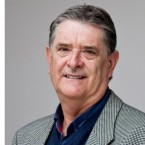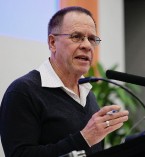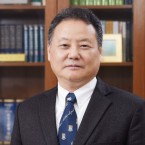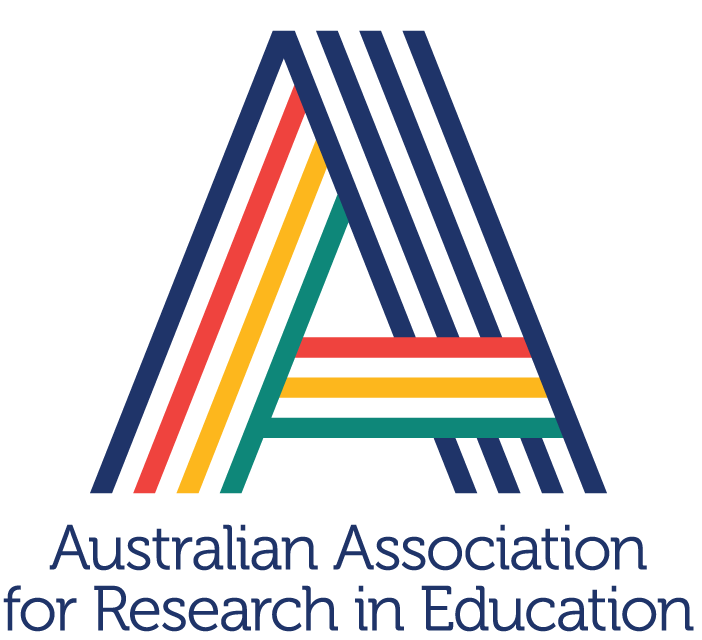Keynote Speakers
2024 Radford Lecture
Professor Wayne Sawyer - Western Sydney University

Wayne Sawyer is Emeritus Professor at Western Sydney University. His central research interests have been in secondary education, particularly English curriculum and pedagogy, in practitioner research, and in pedagogy and engagement in low SES contexts.
Since 2005, Wayne has worked within the Fair Go research program at Western Sydney University - a long-term program focused on working with teachers in high poverty contexts. Fair Go has a key concern with practitioner research and this focus has continued into his broader work, including most recently Western Sydney University’s work with the NSW Department of Education on Higher School Certificate outcomes in NSW public schools. He has been part of teams on ARC grants on secondary education, on Fair Go work across the stages of schooling, and on English curriculum. Related co-authored books include: Exemplary teachers of students in poverty; Engaging schooling : Developing exemplary education for students in poverty and, most recently, Literary knowing and the making of English teachers.
His work with teachers has been acknowledged in his Honorary Life Memberships of the Australian Association for the Teaching of English, the NSW English Teachers Association and various state and national awards for contributions to the teaching profession. In 2018, he received an International Federation for the Teaching of English (IFTE) Award for ‘internationally distinguished contribution to scholarship in the field of English education’.
Lecture Title: Professionalising Professional Learning
Abstract: Literature on teacher professional development consistently highlights the importance of ongoing collaboration. What do teachers specifically name themselves as the value and benefits of collaboration? This lecture begins with this question in the context of a series of Professor Sawyer’s research projects which have been focused on teacher development. The lecture considers in detail interviews with particular teachers to place collaboration within the broader issues of the intellectual work of teaching and ongoing teacher de-professionalisation. The implications of each of these areas is considered in the light of Lingard & Renshaw’s vision of the evidence-informed profession.
Blak Out Tuesday
Associate Professor Kevin Lowe - Scientia Indigenous Fellow - The University of New South Wales

Kevin Lowe is a Gubbi Gubbi man from southeast Queensland. He is a Scientia Indigenous Fellow at UNSW, working on a community and school focused research project on developing a model of sustainable improvement in Aboriginal education. Kevin has had experience in education as a teacher, administrator, and lecturer. He has expertise in working with Aboriginal community organisations on establishing Aboriginal language policy and school curriculum implementation. Recently, Kevin has worked with colleagues to review research across key areas of schooling and established the Aboriginal Voices, a broad-based, holistic project that is developing a new pedagogic framework for teachers.
Lecture Title: What does school reform that is in the best interests of Aboriginal and Torres Strait Islander children look like? Sustained whole-school change in schools.
Abstract: This address comes after more than 40 years of disappointment with the lack of progress across all education systems to effectively enhance educational quality and engagement for Aboriginal and Torres Strait Islander students. The extent of this failure is clear for all to see in the annual reports of the Closing the Gap strategy, despite the allocation of $45 billion to improve the educational outcomes for this group of students.
More progress must be made in supporting schools to effect deep and enduring change in ways that deepen student engagement and support success. However, there are examples of reform where teachers, researchers and Aboriginal and Torres Strait Islander Communities have worked with children and young people to improve schools and schooling in the best interests of all students. Given this, the question becomes, how can these reforms be sustained in ways that suit this cohort? In this presentation, I will introduce one such attempt - the Culturally Nourishing Schooling Project (CNS). The CNS project, a collaboration involving eight universities and 18 educational researchers, aims to understand and address the challenges experienced by Aboriginal and Torres Strait Islander students within the current education system.
My discussion will begin with a focus on research I lead with colleagues into Australia's National Curriculum. This research has identified the depth of current educational policy failure and how this affects school systems’ capacity to understand and support the needs of all Aboriginal and Torres Strait Islander students, and teachers’ capacity to authentically engage in teaching coherent pedagogical narratives and Indigenous knowledges. Addressing this requires an examination of the gaps in current policy and practice and an urgent rethink into establishing teaching practices that better align with the diverse needs of all students. I advocate for comprehensive curriculum reform that is inclusive, culturally sensitive, and engaging as a way to enable all students to see themselves and their communities in the curriculum and experience success.
In discussing the CNS approach to reforming schooling, I emphasise the significance of understanding the pedagogical and curriculum changes needed to support teachers’ work and the critical importance of purposeful, culturally responsive leadership in schools. I will also argue for the importance of cultural mentoring of teachers to create environments where all students can thrive. These discussions will emphasise the work done to sustain systemic change and consider the role of local Indigenous agency in building authentic school and community engagement to establish and sustain whole-school change.
The core element of this moral and social enterprise is to support the development of collaborative relationships between teachers, Aboriginal and Torres Strait Islander students, families, and communities. Current CNS research points to solutions, and in particular, the need to affect systemic and school change, coupled with local relationships and educational governance to form the foundation of a more equitable and responsive education system- one that nurtures the potential of every student and speaks directly to the aspirations of Aboriginal and Torres Strait Islander peoples.
Keynote Address
Professor Rui Yang - Dean, Chair of Education | University of Hong Kong

Rui Yang is Dean and Chair Professor in the Faculty of Education at the University of Hong Kong.
With over thirty-six years of academic career in Mainland China, Australia and Hong Kong, he has an impressive track record on research at the interface of Chinese and Western traditions in education. Bridging the theoretical thrust of comparative education and the applied nature of international education, Professor Yang’s research interests include education policy sociology, comparative and cross-cultural studies in education, international higher education, educational development in Chinese societies, and international politics in educational research.
His international reputation is evidenced by his extensive list of publications, research projects, invited keynote lectures in international and regional conferences, leadership in professional associations and membership in editorial boards of scholarly journals.
Lecture Title: Shared Interests Crossed Wires: China’s Imagined West and Its Impact on Sino-Australian Collaboration in Higher Education
Abstract: Ever since the late 19th century, China has been a devoted student of Western learning with remarkable commitment to substantial, comprehensive, or even wholesale Westernization, deliberately relegating its own rich intellectual resources to the background. The West has historically been the reference frame of China’s self-imagination. Chinese intellectuals learn from the West in their haste with great admiration. Putting aside its extreme opposite due to recent anti-Western sentiment and China’s growth in economic and military terms, such a mindset of unequal cultural relations has remained deeply and widely in society. While the perception of the West has typically been featured by a Utopian understanding of Western politics and culture, such an imagined West has been a critical factor in China’s modernization efforts and directly influences how China engages with the international academic circles that are dominated by Western societies.
Set in a context of growing geopolitical tensions, especially between China and the US-led West (in which Australia is included), this talk elucidates the necessity of and possible approaches to scholarly engagement and collaboration between Australia and China.
Differing from the limited documentation on this timely theme in the literature, my presentation aims to take a different and much-neglected route to look at how the West has been perceived by Chinese academics and how such perception affects scholarly engagement and collaboration between the two countries. It argues that in addition to the geographical proximity and close trade relations, Australia is well placed to further build its strong connections with Chinese universities and researchers in a number of ways, including its highly sought-after international study destination and its Chinese knowledge diaspora.
President's Address
Professor Julie McLeod - Professor of Curriculum, Equity and Social Change, University of Melbourne

Julie McLeod is Professor of Curriculum, Equity and Social Change in the Melbourne Faculty of Education, and from 2017 to 2023 was Pro-Vice Chancellor (Research Capability) at the University of Melbourne. She researches in the history and sociology of education, with interests across youth, gender, curriculum and educational reform and approaches informed by genealogies of educational ideas and qualitative methodologies. Current projects include ‘Progressive Education and Race: A transnational Australian history, 1920s-50s’ and Making Futures a longitudinal study of youth identities, generational change and education (both ARC funded). She is President of the Australian Association for Research in Education, co-editor of the journal History of Education Review, and an elected Fellow of the Academy of Social Sciences Australia.
Lecture Title: Time and time again: history, memory and the temporalities of education research
Abstract: From imperatives to build strong education futures to laments about a lost era of more socially critical schooling or tougher standards and better spelling, the field of education research is characterised by intersecting and mobile ‘multiple temporalities’. Public memory, nostalgia, the pragmatics of planning for the future alongside utopian imaginaries are all important in understanding the work and purposes of education. Themes of change and continuity, disruption and stability, and old and new times are part and parcel of educational discourse; the conference theme itself speaks to the coupling of education and change. This presentation elaborates these temporal dynamics and the hidden histories of education research in reference to 1) longitudinal studies of young people and schooling and 2) oral histories with students and teachers. Both these studies centred processes of memory and generational change: across cohorts, between generations, and across research methods and concepts. In exploring these shifts, I make the case for an expanded understanding of the concept of ‘generations’, further arguing that this can help in sharpening critical attention to the situatedness of educational ideas and the questions that come to matter. Taking up the injunction of the late cultural and literary critic, Fredric Jameson to ‘always historicise’, the presentation concludes with some methodological suggestions or propositions to consider when addressing the temporalities of education research, and in navigating its histories and possible futures.
